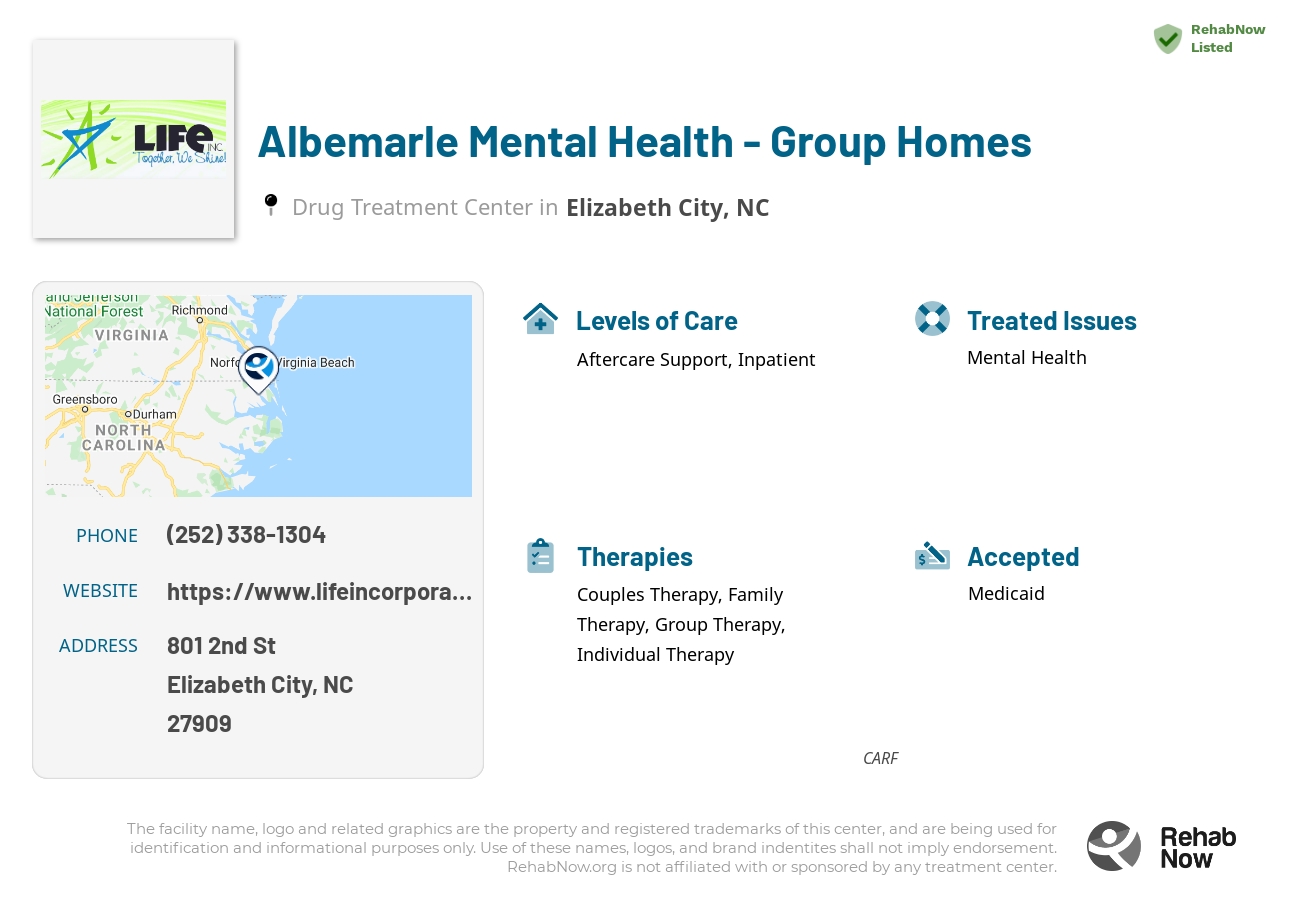Albemarle Mental Health - Group Homes
Drug Rehab Center in Elizabeth City, North Carolina
Albemarle Mental Health Group Homes provides mental health and addiction treatment services including comprehensive care, aftercare support, inpatient and residential long-term care, and various therapeutic techniques and interventions in Elizabeth City, NC.
About This North Carolina Facility
Albemarle Mental Health Group Homes is a behavioral health and addiction treatment center in Elizabeth City, NC that offers a variety of mental health treatment services. The center works with individuals, couples, and families to provide comprehensive care for all levels of care, including aftercare support, inpatient and residential long-term care. Treatment is designed to give clients the tools and support needed to cope with their mental health issues and addictions. Their team of experienced professionals utilizes various therapeutic techniques and interventions, such as family therapy, group therapy, and individual therapy. This helps to foster a safe and supportive environment for clients to receive the care they need.
Albemarle Mental Health Group Homes is accredited by CARF and is affiliated with LIFE. The center is committed to providing quality care and services to the Elizabeth City and surrounding communities. Through its evidence-based approaches and dedication to patient care, Albemarle Mental Health Group Homes is dedicated to helping clients build the skills needed to lead meaningful and productive lives.
Genders
Ages
Modality
Additional
Accreditations

CARF
The Commission on Accreditation of Rehabilitation Facilities (CARF) is a non-profit organization that specifically accredits rehab organizations. Founded in 1966, CARF's, mission is to help service providers like rehab facilities maintain high standards of care.
Conditions and Issues Treated
Levels of Care Offered at Albemarle Mental Health - Group Homes
This center offers a variety of custom treatment tailored to individual recovery. Currently available are Aftercare Support, Inpatient, with additional therapies available as listed below.
Inpatient treatment is an option that provides addicts with a supportive environment in which they can stop using. This type of intensive care and supervision is appropriate for those who were unable to quit on their own or need more structure than they could get from outpatient treatment, such as the addict most in need of this level of care.
The goal of inpatient rehab is for the addict to stay focused on sobriety and remain free of mood altering substances. Inpatient treatment programs usually offer the following: detox, therapy groups, one-on-one counseling, medication management and aftercare planning.
Aftercare is a part of drug rehabilitation. It is also known as “post-treatment support.” Aftercare programs are available for addicts after they complete drug rehab. It is often the final step in the recovery process. The goal of aftercare is to ensure that addicts maintain their achievements in rehab and do not relapse. Professionals generally provide aftercare (including addiction therapists, physicians, social workers, psychologists) and involve individual and group therapy sessions.
Therapies & Programs
Individual therapy is a critical component of addiction recovery. It allows the patients to go deep into their core issues and discover how to handle those problems better. Therapy can be conducted in individual sessions as well as group settings. In individual therapy for addiction, the patient meets with their therapist one-on-one to focus on the underlying issues. This allows patients to open up and discuss personal topics they may not feel comfortable discussing in a group setting. This type of therapy can help develop solutions specific to each patient, which helps speed up the recovery process.
Couples therapy is beneficial for couples in which at least one partner has a substance use disorder. This type of therapy can help partners improve communication skills, which is an important factor in a healthy relationship. It can also help partners better understand one another so they have a greater understanding of how the other partner may be feeling.
Benefits of couples therapy include:
- Improvement in communication skills
- Increased understanding of the dynamics within a relationship
- Increased sense of support and trust in the relationship
- Better teamwork between partners/increased willingness to listen and work together
- Enhanced tolerance of each other’s shortcomings
- Improved ability to have open, honest communication with each other
Family therapy is a crucial part of drug treatment and getting sober. It is one of the most effective ways to help addicts stay on the path to long-term sobriety. When a drug addict decides that they want to try and get sober, it takes the support of every person they love to succeed. It can be incredibly difficult for loved ones to watch an addict go through the pain and suffering of withdrawal, but by being there with them and supporting them, they can help to make sure that the addiction never returns.
One of the most important parts of family therapy is the relapse prevention plan. During treatment, therapists and doctors will often sit down with the addict and their family to develop a plan in case the addict ever feels like they want to use again. This plan should involve steps the addict and family can take together to prevent them from relapsing in the future. An addict’s family can play a vital part in helping them to avoid relapse because they can spot the warning signs and help them get back on track before it becomes too much of a problem.
Group therapy helps prevent addicts from feeling isolated or unique in their situation by offering a sense of comfort and fellowship. It also creates a forum for addicts to build their support systems and learn from each other. The group therapy sessions at Albemarle Mental Health - Group Homes occur in a group setting rather than one-on-one to create a safer, controlled environment where addicts feel comfortable.
Payment Options Accepted
For specific insurance or payment methods please contact us.
LIFE Associated Centers
Discover treatment facilities under the same provider.
Learn More About LIFE Centers
Additional Details
Specifics, location, and helpful extra information.
Elizabeth City, North Carolina 27909 Phone Number(252) 338-1304 Meta DetailsUpdated November 25, 2023
Staff Verified
Patient Reviews
There are no reviews yet. Be the first one to write one.
Elizabeth City, North Carolina Addiction Information
North Carolina ranks 29th in the nation for overall substance abuse. Many of the drugs abused in the state are illicit, and many of these are opioids. Prescription opioids are readily available due to the high rates of medical workers prescribing them. The number of prescriptions has increased tenfold since the 1980's. Opioid overdoses are the most common type of death in North Carolina.
In 2016, 6.2% of the population in Elizabeth City, North Carolina, reported past-month use of an illicit drug. The most commonly used drugs are Prescription opioids (morphine, oxycodone, hydrocodone), Heroin, Cocaine, Marijuana, and Methamphetamine. However, any drug can be addictive and lead to abuse. The best way to find the best drug treatment facility in Elizabeth City, North Carolina, is to ask for referrals from friends or family members.
Treatment in Nearby Cities
- Thomasville, NC (217.9 mi.)
- Bryson City, NC (409.6 mi.)
- Norlina, NC (110.7 mi.)
- Newport, NC (111.1 mi.)
- Danbury, NC (222.2 mi.)
Centers near Albemarle Mental Health - Group Homes
The facility name, logo and brand are the property and registered trademarks of Albemarle Mental Health - Group Homes, and are being used for identification and informational purposes only. Use of these names, logos and brands shall not imply endorsement. RehabNow.org is not affiliated with or sponsored by Albemarle Mental Health - Group Homes.





